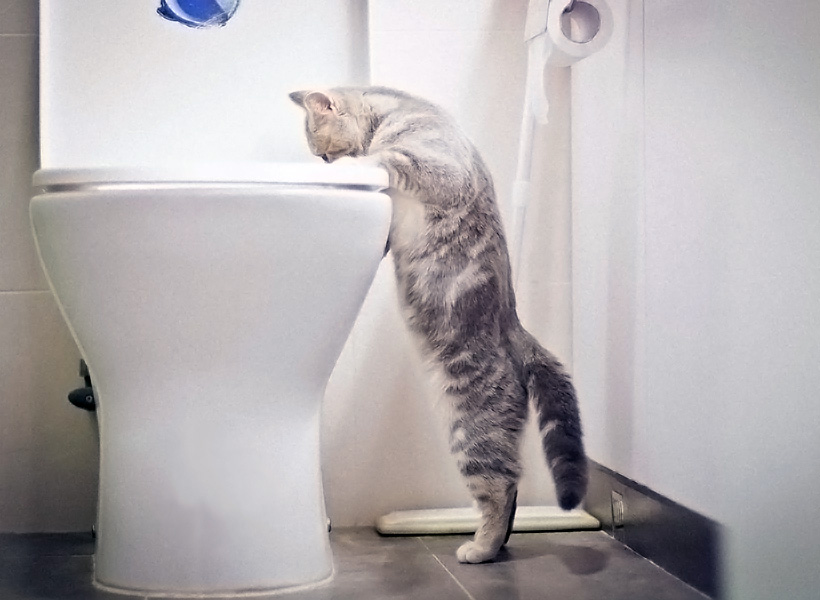Why You Mustn't Flush Cat Poop Down Your Toilet - Maintain Your Pipe Health
Why You Mustn't Flush Cat Poop Down Your Toilet - Maintain Your Pipe Health
Blog Article
The article following next in relation to Can You Flush Cat Poo or Litter Down the Toilet? is incredibly entertaining. Read it for yourself and decide what you think about it.

Intro
As pet cat owners, it's essential to be mindful of just how we dispose of our feline pals' waste. While it may appear practical to flush feline poop down the bathroom, this method can have detrimental effects for both the atmosphere and human health and wellness.
Alternatives to Flushing
Fortunately, there are more secure and much more accountable means to dispose of feline poop. Consider the adhering to options:
1. Scoop and Dispose in Trash
The most common method of getting rid of cat poop is to scoop it into an eco-friendly bag and throw it in the trash. Be sure to make use of a devoted litter inside story and get rid of the waste promptly.
2. Usage Biodegradable Litter
Choose eco-friendly cat trash made from products such as corn or wheat. These litters are eco-friendly and can be securely gotten rid of in the garbage.
3. Hide in the Yard
If you have a lawn, take into consideration hiding cat waste in an assigned area far from veggie gardens and water sources. Be sure to dig deep enough to avoid contamination of groundwater.
4. Install a Pet Waste Disposal System
Invest in a family pet garbage disposal system specifically developed for pet cat waste. These systems use enzymes to break down the waste, lowering odor and ecological effect.
Health and wellness Risks
In addition to ecological problems, flushing feline waste can also present health threats to human beings. Cat feces may include Toxoplasma gondii, a parasite that can trigger toxoplasmosis-- a possibly severe health problem, especially for pregnant women and individuals with weakened immune systems.
Ecological Impact
Flushing cat poop presents unsafe microorganisms and bloodsuckers into the water, posing a considerable danger to aquatic ecological communities. These impurities can adversely affect marine life and concession water top quality.
Final thought
Responsible pet dog possession extends past supplying food and sanctuary-- it also includes appropriate waste administration. By refraining from purging cat poop down the bathroom and selecting alternate disposal methods, we can decrease our environmental footprint and shield human health.
Why You Should Never Flush Cat Poop Down the Toilet
A rose by any other name might smell as sweet, but not all poop is created equal. Toilets, and our sewage systems, are designed for human excrement, not animal waste. It might seem like it couldn’t hurt to toss cat feces into the loo, but it’s not a good idea to flush cat poop in the toilet.
First and foremost, assuming your cat uses a litter box, any waste is going to have litter on it. And even the smallest amount of litter can wreak havoc on plumbing.
Over time, small amounts build up, filling up your septic system. Most litter sold today is clumping; it is made from a type of clay that hardens when it gets wet. Ever tried to scrape old clumps from the bottom of a litter box? You know just how cement-hard it can get!
Now imagine just a small clump of that stuck in your pipes. A simple de-clogger like Drano isn’t going to cut it. And that means it’s going to cost you big time to fix it.
Parasitic Contamination
Believe it or not, your healthy kitty may be harboring a nasty parasite. Only cats excrete Toxoplasma in their feces. Yet it rarely causes serious health issues in the cats that are infected. Most people will be fine too if infected. Only pregnant women and people with compromised immune systems are at risk. (If you’ve ever heard how women who are expecting are excused from litter cleaning duty, Toxoplasma is why.)
But other animals may have a problem if infected with the parasite. And human water treatment systems aren’t designed to handle it. As a result, the systems don’t remove the parasite before discharging wastewater into local waterways. Fish, shellfish, and other marine life — otters in particular — are susceptible to toxoplasma. If exposed, most will end up with brain damage and many will die.
Depending on the species of fish, they may end up on someone’s fish hook and, ultimately on someone’s dinner plate. If that someone has a chronic illness, they’re at risk.
Skip the Toilet Training
We know there are folks out there who like to toilet train their cats. And we give them props, it takes a lot of work. But thanks to the toxoplasma, it’s not a good idea.

We had been made aware of that report on How to Dispose of Cat Poop and Litter Without Plastic Bags from a friend on another web page. For those who appreciated our page plz be sure to share it. Thanks for taking the time to read it.
Phone Report this page